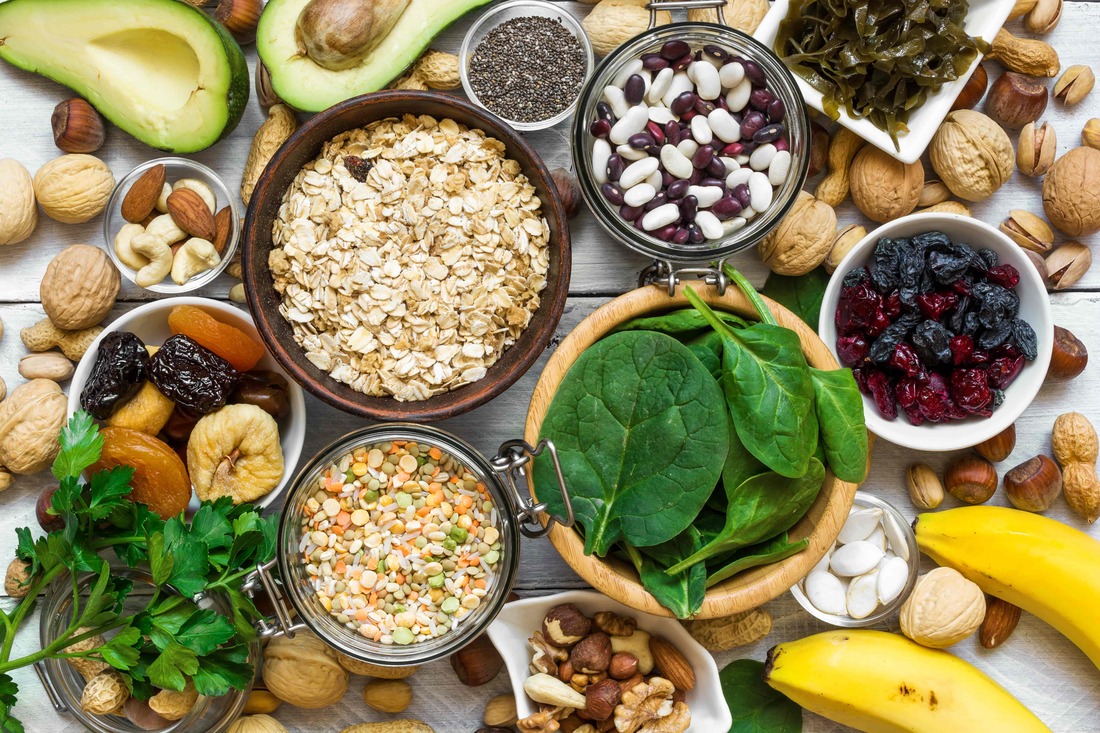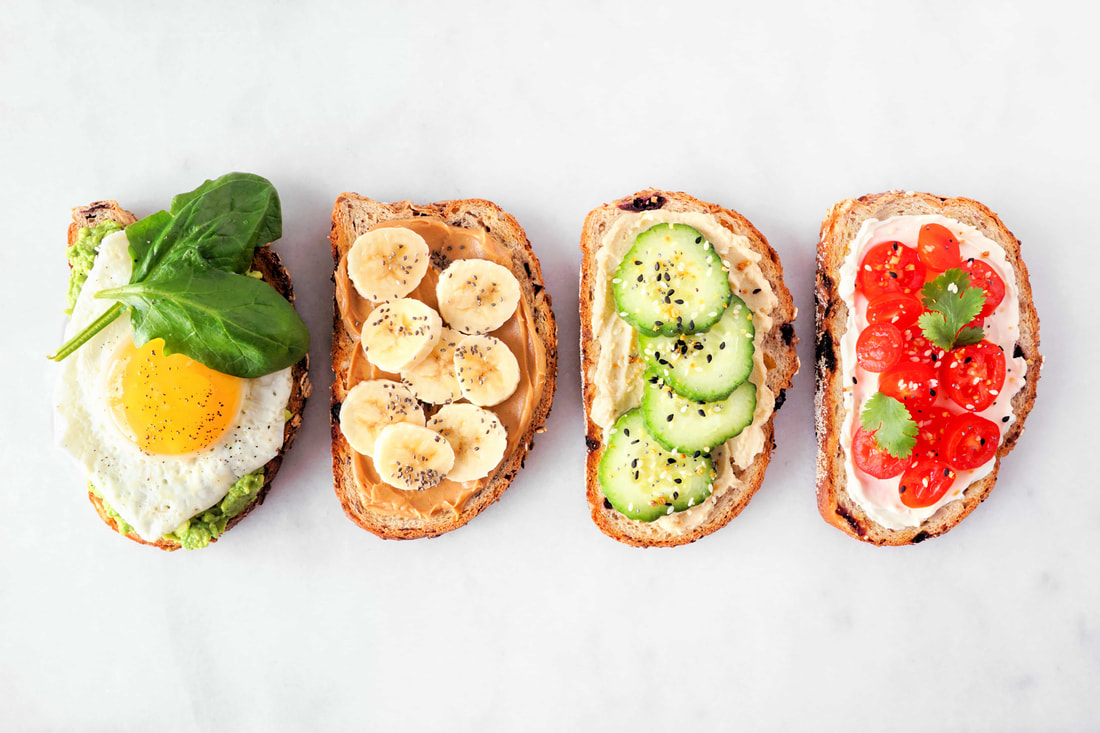|
Written by: Claudia Haller NBC-HWC
Have you ever paid attention to how you feel after you eat certain foods? What you eat can have a significant impact on your mood. Personally, I’ve noticed that foods dense in carbs send me into what I call a “carb coma”. They give me energy immediately, but I quickly crash and always end up feeling drained. I remember one time after eating a big New York-style bagel, I almost fell asleep driving back home to New Jersey; I had to pull over.
Foods that are high in sugar and refined carbs can cause spikes in blood sugar levels, which produce energy immediately but ultimately lead to feelings of anxiety and irritability. On the other hand, healthy foods rich in nutrients like vitamins, minerals, and healthy fats can help improve mood and promote feelings of calm and well-being. Whether or not you realize it, what you put into your body can greatly impact your outlook on the other aspects of your life. If you're looking for mood-boosting foods to add to your diet, consider incorporating some of the following: 1. Salmon: Salmon is a great source of omega-3 fatty acids, which have been shown to improve mood. Omega-3s help to protect against cognitive decline and can also improve joint health. If you don't like salmon, you can also get omega-3s from other fish, such as tuna or mackerel, or from flaxseeds or chia seeds. All of these fatty fish are known to support brain health and reduce symptoms of depression and anxiety. 2. Dark chocolate: Who doesn't love chocolate? Luckily for us, dark chocolate is not only delicious but also good for our mood. This treat contains flavonoids, which are plant-based compounds that have been shown to reduce stress and improve heart health. The other antioxidants found in dark chocolate can also reduce inflammation. Best of all, indulging in a small piece of dark chocolate can stimulate the release of endorphins, those “feel good” hormones. Make sure to choose dark chocolate with a high cocoa content (70% or higher) to truly experience these benefits. 3. Spinach: This leafy green vegetable is packed with essential nutrients for our overall health, including magnesium, folic acid, and vitamins B6 and E. These nutrients have all been linked with improved mood and increased energy levels. They have also proven impactful in mood regulation, which helps us keep our highs and lows under control. Add spinach to your next smoothie or salad for a boost of mood-enhancing power.
4. Seeds and nuts: Seeds and nuts are another great source of omega-3 fatty acids and magnesium—two essential nutrients for a healthy nervous system and improved mood. They are also good sources of fiber, which can help regulate digestion and keep you feeling fuller longer. Seeds and nuts are another addition to your diet that can help you maintain a balanced mood and reduce stress. The next time you’re feeling down, don’t reach for the chips or the candy. Rather, snack on a handful of sunflower seeds or pistachios for a quick pick-me-up.
5. Blueberries: Blueberries are one of nature's best foods—not only are they delicious, but they're also packed with nutrients that are good for our health, including vitamins C and B6, fiber, and antioxidants. Antioxidants help protect cells from damage and improve overall immunity, which can lead to increased energy levels and improved mood. Whether it’s adding some fresh blueberries to your morning oatmeal or yogurt for a nutrient-rich start to the day or enjoying a bowl of fresh strawberries for dessert at the end of your day, incorporating them into your diet is a good idea for many reasons. 6. Oats: Oats are a complex carbohydrate that can help stabilize blood sugar levels and your mood. Note that while refined carbs tend to have a negative impact on your mood, not all carbs are bad! In fact, complex carbohydrates support a healthy gut which directly correlates with our mental health as the large majority of serotonin is produced in the gut. My favorite way to enjoy oats is by preparing overnight oats at the beginning of the week and eating them as a light breakfast or snack throughout the week. However, there are a variety of ways to incorporate them into your diet including substituting oat milk in your beverages, baking goods with oats, or even finding them in store-bought snack bars.
7. Avocado and Banana: After all of these years it seems that avocados and bananas are still trendy, and there are so many reasons why. They both contain healthy fats that support brain health and have been proven to reduce symptoms of anxiety and depression. In addition, they contain tryptophan, an amino acid that the body converts into serotonin. Thanks to recipe gurus across social media, we now know we can do just about anything with these nutritious foods. Whether you put some on toast for an instagrammable breakfast or use them to thicken up a homemade smoothie, there is definitely some way for you to include banana or avocado in your diet.
It is important to recognize that everybody has their own unique reactions to foods. One way to learn more about how your body reacts to food is by pursuing food journaling. If you’d like to learn more about this resource, check out our blog here: That being said, by eating foods that are known to boost your mood, you can help yourself feel happier and more energetic throughout the day, every day. Consider everything you put into your body as an investment for both your physical and mental well-being. Pick a couple of the foods and preparations recommended above and add them to your meal plan for next week. Your brain and body, as well as the people around you who get to experience your newfound radiance, will thank you!
Additional Resources:
If you’re interested in more of the science behind the connection between nutrition and mental health, check out this blog from Harvard Health on Nutritional Psychiatry: https://www.health.harvard.edu/blog/nutritional-psychiatry-your-brain-on-food-201511168626 It’s no secret that our culture is experiencing a mental health crisis. Mood disorders have certainly been brought to the forefront of the issues we need to address. To learn more about the relationship between nutrition and mood disorders from a clinical perspective, check out this publication from the National Institute of Mental Health (NIMH): https://www.nimh.nih.gov/health/publications/eating-disorders/index.shtml Claudia is an NBC-HWC Board Certified Health and Wellness Coach, the owner of Vibrant Health by Claudia LLC and Virtual Health Coaches LLC. She studied health and wellness coaching at the Institute for Integrative Nutrition where she also completed courses in Gut Health, Hormone Health, and Advanced Coaching. She is a certified 21-Day Sugar Detox Coach as well as a co-author of two Amazon Bestsellers “The Ultimate Guide to creating your soul aligned Business” and “The Ultimate Guide to Becoming a successful soul professional”. To schedule a time for a free information call click here or join her Vibrant Health Power Community - a free Facebook Group - here.
Disclaimer: The views and opinions expressed in this guest blog post are solely those of the author and do not necessarily reflect the official policy or position of our website. We take no responsibility for any errors or omissions in the content provided. The information shared in this post is intended to be informative and educational, but it is always essential to conduct further research and seek professional advice where appropriate. We encourage our readers to form their own opinions and perspectives based on multiple sources and individual judgment.
0 Comments
Leave a Reply. |
take control of your health.Connect with a board certified coach to help you succeed with health changes. COACHES:
|





